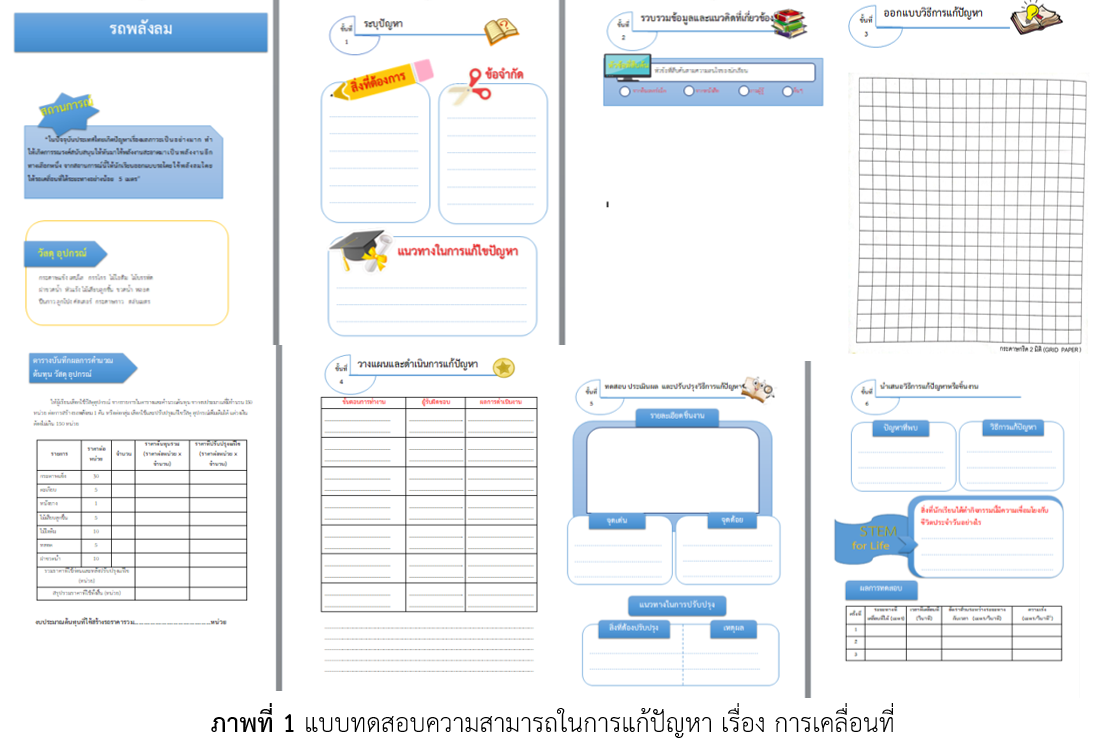ผลการจัดกิจกรรมการเรียนรู้ตามแนวทางสะเต็มศึกษาในรายวิชาฟิสิกส์ เรื่อง การเคลื่อนที่ ของนักเรียนชั้นมัธยมศึกษาปีที่ 4
Main Article Content
บทคัดย่อ
การวิจัยนี้มีวัตถุประสงค์เพื่อศึกษาผลจากการจัดการเรียนรู้ด้วยกิจกรรมการเรียนรู้ตามแนวทางสะเต็มศึกษา เรื่อง การเคลื่อนที่ โดยการเปรียบเทียบผลสัมฤทธิ์ทางการเรียนก่อนและหลังเรียน เปรียบเทียบความสามารถในการแก้ปัญหากับเกณฑ์ร้อยละ 75 และศึกษาความพึงพอใจของนักเรียนที่มีต่อการจัดกิจกรรมการเรียนรู้นี้ กลุ่มตัวอย่างที่ใช้ในการวิจัยเป็นนักเรียนชั้นมัธยมศึกษาปีที่ 4/1 จำนวน 37 คน ภาคเรียนที่ 2 ปีการศึกษา 2561 โรงเรียนเบญจมราชรังสฤษฎิ์ 2 ที่ได้จากการสุ่มตัวอย่างแบบกลุ่ม เครื่องมือที่ใช้ ได้แก่ แผนการจัดการเรียนรู้ตามแนวทางสะเต็มศึกษา เรื่อง การเคลื่อนที่ จำนวน 5 แผน แบบทดสอบวัดผลสัมฤทธิ์ทางการเรียน แบบทดสอบความสามารถในการแก้ปัญหา และแบบสอบถามความพึงพอใจที่มีต่อการจัดการเรียนรู้ตามแนวทางสะเต็มศึกษา การวิจัยเป็นแบบการทดลองเบื้องต้น ผลการวิจัยพบว่า นักเรียนมีผลสัมฤทธิ์ทางการเรียนหลังเรียน (mean 23.24, S.D. 2.14) สูงกว่าก่อนเรียน (mean 11.41, S.D. 2.37) อย่างมีนัยสำคัญทางสถิติที่ระดับ .05 นักเรียนมีความสามารถในการแก้ปัญหา (81.87% ) สูงกว่าเกณฑ์มาตรฐานอย่างมีนัยสำคัญทางสถิติที่ระดับ .05 และนักเรียนมีความพึงพอใจต่อการจัดกิจกรรมการเรียนรู้ตามแนวทางสะเต็มศึกษาอยู่ในระดับความพึงพอใจมากที่สุด (mean 4.52, S.D. 0.54)
Article Details
วารสารวิทยาศาสตร์และวิทยาศาสตร์ศึกษา (JSSE) เป็นผู้ถือลิสิทธิ์บทความทุกบทความที่เผยแพร่ใน JSSE นี้ ทั้งนี้ ผู้เขียนจะต้องส่งแบบโอนลิขสิทธิ์บทความฉบับที่มีรายมือชื่อของผู้เขียนหลักหรือผู้ที่ได้รับมอบอำนาจแทนผู้เขียนทุกนให้กับ JSSE ก่อนที่บทความจะมีการเผยแพร่ผ่านเว็บไซต์ของวารสาร
แบบโอนลิขสิทธิ์บทความ (Copyright Transfer Form)
ทางวารสาร JSSE ได้กำหนดให้มีการกรอกแบบโอนลิขสิทธิ์บทความให้ครบถ้วนและส่งมายังกองบรรณาธิการในข้อมูลเสริม (supplementary data) พร้อมกับนิพนธ์ต้นฉบับ (manuscript) ที่ส่งมาขอรับการตีพิมพ์ ทั้งนี้ ผู้เขียนหลัก (corresponding authors) หรือผู้รับมอบอำนาจ (ในฐานะตัวแทนของผู้เขียนทุกคน) สามารถดำเนินการโอนลิขสิทธิ์บทความแทนผู้เขียนทั้งหมดได้ ซึ่งสามารถอัพโหลดไฟล์บทความต้นฉบับ (Manuscript) และไฟล์แบบโอนลิขสิทธิ์บทความ (Copyright Transfer Form) ในเมนู “Upload Submission” ดังนี้
1. อัพโหลดไฟล์บทความต้นฉบับ (Manuscript) ในเมนูย่อย Article Component > Article Text
2. อัพโหลดไฟล์แบบโอนลิขสิทธิ์บทความ (Copyright Transfer Form) ในเมนูย่อย Article Component > Other
ดาวน์โหลด ไฟล์แบบโอนลิขสิทธิ์บทความ (Copyright Transfer Form)
เอกสารอ้างอิง
Besa, N. (2015). Effects of STEM Education Approach on Biology Achievement, Problem Solving Ability and Instructional Satisfaction of Grade 11 Students (in Thai). Master's Thesis. Songkla: Prince of Songkla University.
Chanprasert, S. (2014). Design of learning management based-on STEM Education approach and development of the 21st century skills (in Thai). IPST Magazine, 48(192), 14-17.
Institute for the Promotion of Teaching Science and Technology (IPST). (2014). Handbook of Evaluation and Assessment in Science (in Thai). Bangkok: IPST.
Institute for the Promotion of Teaching Science and Technology (IPST). (2003). STEM Education (in Thai). Bangkok: IPST.
Kuaklung, K., Kessaratikoon, P. and Prasitpong, S. (2018). The study of achievement by stem education on equilibrium and elasticity for grade 11 students (in Thai). Journal of Education Thaksin University, 18(2), 124-135.
Ministry of Education. (2008). Basic education Core Curriculum 2008 (in Thai). Bangkok: Ministry of Education.
Phanit, W. (2012). Learning creation methods for learners in the 21st century (in Thai). Bangkok: Sodsri-Saritwong Foundation.
Phitaksa, T., Phitaksa, P., Rungrot, N., Phonchaiya, S. and Wuttisela, K. (2019). Effects of STEMeducation approach on food racing car for grade six students (in Thai). Journal of Science and Science Education, 2(1), 57-70.
Reeve, M. E. (2013). Implementing Science, Technology, Mathematics, and Engineering (STEM) Education in Thailand and in ASEAN. A Report Prepared for The Institute for the Promotion of Teaching Science and Technology (IPST).
Salaeh, N., Mophan, N. and Waedramae, M. (2017). Effect of STEM Education on chemistry achievement, analytical thinking ability and instructional satisfaction of grade 10 students (in Thai). Princess of Naradhiwas University Journal of Humanities and Social Sciences, 4(1), 42-53.
Siripatharachai, P. (2013). STEM Education and 21st Century Skills Development (in Thai). Executive Journal, 33(2), 49-56.
Traimongkolkul, P. and Chatraphorn, S. (2000). Research Design, 3rd ed., (in Thai). Bangkok: Kasetsart University Press.


